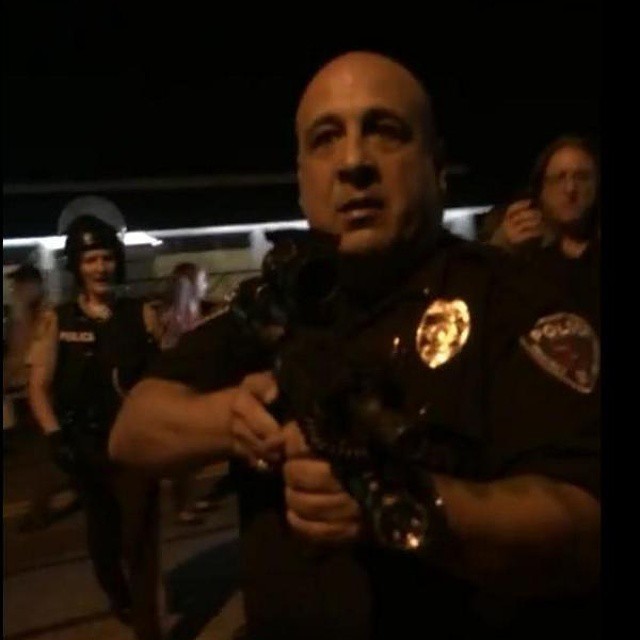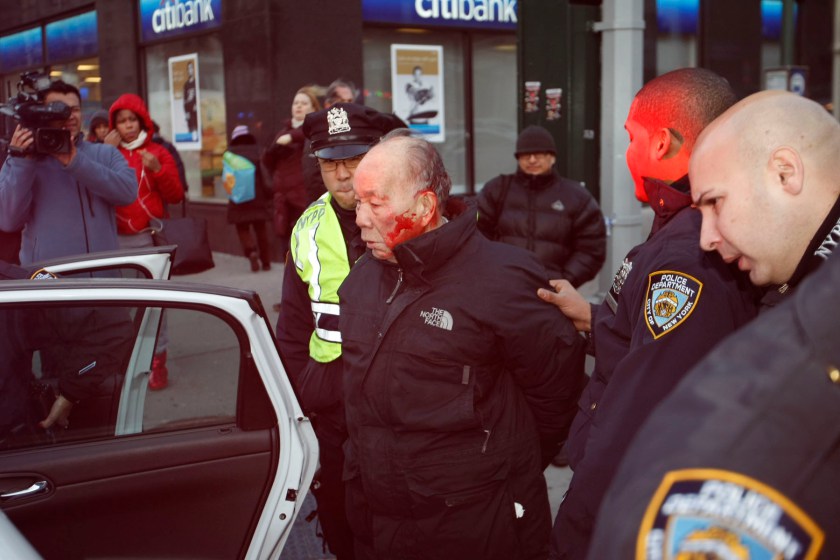 |
| "Officer Go Fuck Yourself" , aptly named for brandishing a weapon at an unarmed journalist and refusing to give his name. |
"... I looked into this white bald headed man, and I saw his eyes, I feared the moment that so many young Black and Latino, Latina men and women face, potential death..."At first, my gut reaction as an Asian American is to take offense. Why do you leave us out? I wonder. I've known and heard of so many who have suffered brutality at the hands of police, who have experienced extreme prejudice and institutionalized racism. My gut reaction is to grouse, to be angered at the idea of being looked at as the "model minority" yet again. No wonder the Asian American voice is quiet when it comes to Ferguson. We've been left out again.
And then I realize - we can't think this way. We can't allow these lines of division to be drawn between us. There is no one to fault - many Asian Americans become complacent with the model minority myth because in many cases, our fellow non-Caucasians don't feel solidarity with us. They don't know that behind the myths and the stereotypes, Asian American urban youth suffer from issues of poverty, of lack of adequate education, of poor college retention. Asian Americans, too, face police brutality and should - must care about what's happening in Ferguson.
In 2006, four Asian Americans - Karen Chen, Quan Manh Thin, Tat M. Yuen, and Howard Ng - were pepper-sprayed at close range by a police officer while they stood outside of the Super 88 Market. Karen Chen, hardly five feet tall, was tackled to the ground. Tat Yuen was knocked unconscious. All were charged and convicted with either disorderly conduct or resisting arrest.
In 2007, 18-year-old Marlo Custodio was pulled out of his car and slammed into the hood by a police officer while simply sitting and eating while the car was parked. He called his mother for aid, and the police roughed her up as well.
In 2011, the Rapada family was disproportionately brutalized after police officers - a 'fireworks abatement team' dressed in battle dress uniform - drove over an unignited prohibited firework that the family had procured for the Fourth of July. The encounter resulted in the following chaos:
"A crowd teeming with people was nearby, which included Wendell Rapada. He was walking towards his home just a short distance from the scene. The officers accosted him and proceeded to choke him. Wendell was unarmed and turning blue. Ephraim Rapada witnessed what was happening, asking the officers why they were harming Wendell. The officers viciously turned on the elder Rapada. His daughter Crystal, who had been in the house, came out. Seeing what was happening to her father, she was frantic and tried to get between her father and the officer. She was taken to the ground, held down by an officer's foot on her neck. Ervin Rapada witnesses the scene and pleads for the officers to stop. He is attacked by 3 officers, one of whom tazed him 4 times. Crystal Rapada is frantic, calling out for her father who is injured. She is mocked by the officers on the way to the hospital..."In January of this year, an 84-year-old Chinese man in New York City named Kang Wong was beaten for jaywalking, because, with limited English skills, he could not understand what officers were asking of him.
 |
| Kang Wong, 84, of New York. (Photo Credit: G.N. Miller / NY Post) |
"Minorities" are only a minorities when they are segregated from one another - the solidarity of minorities into a majority is dangerous to those who assert their dominance in the form of brutality and institutionalized racism. For those who actively seek to benefit from the perception of White Americans as the majority, it is helpful to say, "Black and Hispanic America, Asian Americans are not you," and "Asian America, you are not them."
Solidarity of "minorities" is threatening. Recognition of our common victimization and oppression is a step towards empowerment - towards no longer being victims.

No comments:
Post a Comment